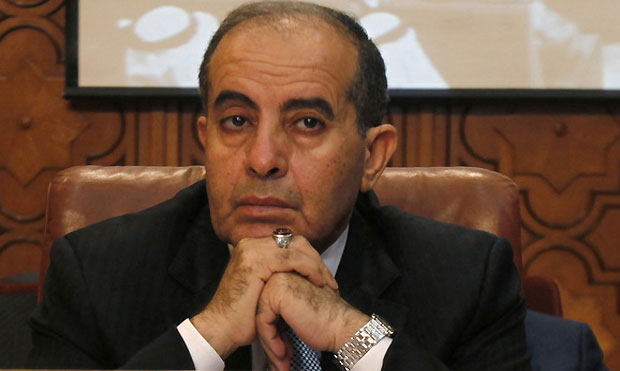
File photo of former Libyan interim prime minister Mahmoud Jibril. (Reuters/Mohamed Abd El-Ghany)
Cairo, Asharq Al-Awsat—Former interim Libyan prime minister Mahmoud Jibril informed Asharq Al-Awsat that he respects the controversial Political Isolation Law that was passed by parliament last month, which bans him from political office for ten years, but stressed that there are a number of issues that must be resolved.
Speaking exclusively to Asharq Al-Awsat, Jibril said: “We can talk about this law on several different levels. The first level is my own position towards the law. So long as this law was issued from a legitimate and elected body, then it must be accepted. However, as for my analysis of this law, the objective of this law is not to protect or immunize the revolution as some people claim; rather, it is to remove all the potential political competition after they were unable to remove them through democratic means on June 7, namely through the National Congress elections. Therefore, they resorted to the use of arms and pressure to pass this law.”
“The second objective is to remove current staff from posts and jobs in state institutions, [in order] to fill these positions on the basis of political loyalty and with figures affiliated to particular political trends. What happened is not the isolation of a regime, but the isolation of a country. The isolation of a regime happened in Iraq based on ideological constraints [de-Ba’athification],” Jibril added.
Jibril described de-Ba’athification as the isolation of an ideology and regime, but stressed that “as for what is happening in Libya, this is far worse, for it is the isolation of the state of Libya. [It is] the isolation of all Libyan state apparatus from 1969 till October 2011 … to free up civil service jobs in order to fill these with members or affiliates of a specific political trend.”
Asked by Asharq Al-Awsat to name this specific political trend, Jibril acknowledged: “This is a mixture, in fact, of different Islamist trends.”
“By God, I hope that I am wrong. However, of course, the arrival of new people with no administrative experience will result in two things … either the provision of services only to those with the same political affiliation … or, at best, for services to be provided to all, but for these services to be stalled even more than they are now due to this administrative inexperience,” he added.
Libya’s political isolation law prevents any official who served in the Gaddafi-era government from participating in post-revolutionary politics for ten years. The isolation law covers the period between 1969 until the declaration of liberation in October, 2011, and isolates a number of senior Libyan political figures. The list of those affected by the isolation law include Mahmoud Jibril himself, former Libyan parliamentary speaker Mohammed Al-Maqrif—who was forced to resign when the law came into effect—and post-revolution interior minister Ashour Showail.
Jibril stressed, “This is what confirms that this law has nothing to do with protecting the revolution, but rather it is settling a political score. If we looked at this issue carefully, particularly regarding those who opposed the Gaddafi regime from abroad, we would find that their long history of opposition was not taken into account, even for those who strongly contributed to Gaddafi’s ouster.”
“The end result is that those who will take up these [governmental] positions are those who were imprisoned during the Gaddafi era … and the majority of these figures belong to the Islamist trend. Therefore, this law is not out of concern for the revolution as much as it is settling scores with the pre-October 2011 Libyan state.”
Jibril, who served as head of the opposition National Transitional Council and later as interim prime minister following Gaddafi’s ouster, described the political isolation law as unfair.
“Many of those who were at the head of the political scene between February and October 2011 worked within the Libyan state, although the majority had no connection to Gaddafi’s vision but were simply civil servants. One cannot describe [justice Minister during the Gaddafi era] Mustafa Abdel-Jalil, for example, as being a member of the Gaddafi regime, even though he worked for the Libyan state.”
“The other issue is that this law has managed to appropriate Libyan history, because opposition figures such as the late Mansour Kikhia have been retroactively politically isolated. Figures such as Abdul-Fattah Younis, Commander Ali Hadouth, Colonel Omar El-Hariri … have all been politically isolated,” he told Asharq Al-Awsat.
Jibril stressed that this law not only affects the country’s past and present, it also harms its future, causing division with Libyan society and delaying national reconciliation.
“Therefore, this law, in my view, contravenes the nature and objectives of the Libyan people, which we believe had been embodied in the February 17, 2011, revolution,” Jibril emphasized.
Responding to a question about the controversy that surrounding the enactment of the Political Isolation Law, with armed Islamist militias being present outside parliament and government ministries when the law was passed, Jibril said: “Some MPs said that they were subject to pressure and threats [to pass the law]. Others said that they received a circular in the morning—which some MPs found on their seats in parliament—which included a threat against all those who voted against the law. In addition to this, coffins were placed in front of the parliament in a clear, threatening message.”
“There was also another form of threat against all members of the National Congress, as some ministries were surrounded. Therefore, some MPs weighed a lesser damage against a greater one, and saw that the greatest loss would be the collapse of legitimacy, so they accepted making a smaller sacrifice, even if they were unconvinced by this law.”
